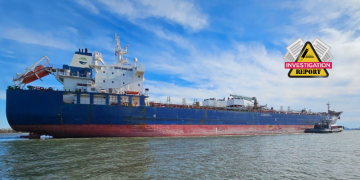In an exclusive interview to SAFETY4SEA, Professor Lynn Loo, Chief Executive Officer of the Global Centre for Maritime Decarbonisation (GCMD), emphasizes the need for the industry to adopt a hands-on approach to accelerate the adoption of alternative fuels such as ammonia and biofuels.
This practical approach is vital for building confidence across the ecosystem in the safe and effective use of these fuels, as well as for understanding their real-world operational challenges. A major hurdle remains: upskilling 800,000 seafarers to handle these new fuels. In this context, Professor Loo highlights the opportunity for the industry to invest in its existing seafaring workforce and foster collaborative efforts to meet this challenge.
SAFETY4SEA: What are the biggest challenges facing the maritime industry in the energy transition? At this moment, what are your top concerns?
Prof. Lynn Loo: The energy transition is expected to be inflationary, as it involves shifting from a mature system with established infrastructure—like oil—to less familiar alternatives with higher perceived risks and substantial infrastructure needs. Compounded by mounting geopolitical uncertainties and economic headwinds, the gap between decarbonisation ambitions and what is practically achievable in the near term is widening. This, will make maritime decarbonisation even more challenging. Yet, we must balance the near term commercial imperatives with our longer term decarbonisation targets. As long as we agree that it is no longer acceptable to continue causing irreparable damage to our environment, we need to start addressing this major challenge now with the resources currently available to us.
S4S: What global policy changes—whether from the IMO or national governments—would most effectively accelerate the transition to zero-emission shipping?
Prof. L.L.: The strength of IMO regulations stems from the industry’s history of unified compliance with mandates, like the implementation of SOx scrubbers, which were adopted within a short time frame. As the sole global regulator, the IMO has the authority to establish clear and ambitious regulations, including a robust GHG fuel standard and a global carbon pricing mechanism, to dramatically accelerate the transition to cleaner fuels. National governments can further support this by promoting green fuels production, accelerating renewable electricity generation, and developing port infrastructure. However, these regulatory and supportive pathways require a balance between near-term commercial imperatives and long-term decarbonisation targets. Consequently, IMO regulations will need to navigate this tension, ensuring practical implementation while maintaining a trajectory towards ambitious net zero goals.
S4S: What are the biggest opportunities and challenges related to the human element in shipping’s decarbonization journey?
Prof. L.L.: A key challenge is the need to upskill as many as 800,000 seafarers by mid-2030’s to handle alternative fuels. GCMD is actively addressing this by developing competency frameworks which can inform training curricula for the safe handling of new fuels as well as safe offloading of liquid CO2.This presents an opportunity for creating high-value jobs and leveraging the existing seafaring workforce, particularly in regions like Asia. Collaboration between industry stakeholders, including academies and competency development centres and ship managers, and engagement with the seafarers themselves are crucial to ensure they are prepared for a multi-fuel future.
S4S: If you could change one thing in the industry from your perspective what would it be and why?
Prof. L.L.: If I could change one thing in the maritime industry to accelerate decarbonisation, it would be to foster a greater culture of ‘learning by doing’ through more pilots and trials conducted in real-world commercial operating conditions. This practical approach is essential for building ecosystem confidence in the safe and effective deployment of solutions like ammonia bunkering and biofuels use, and for understanding their operational realities. GCMD has facilitated such pilots and trials by fostering collaboration across the entire value chain, including shipowners, charterers, fuel suppliers, technology providers, testing laboratories, financiers, insurers, and regulatory bodies. This collaborative approach ensures that the pilots address industry-relevant pain points and that the learnings can be readily adopted across the industry.
The views presented are only those of the authors and do not necessarily reflect those of SAFETY4SEA and are for information sharing and discussion purposes only.




































































